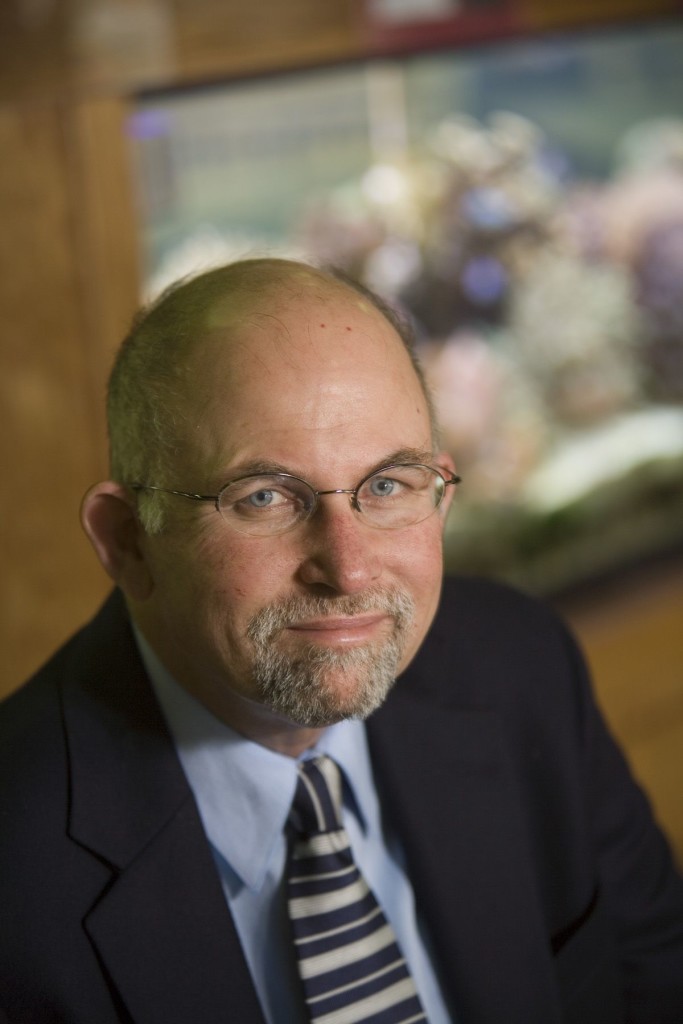
The big break came in the early 1980s, when Dr. Mark Dewhirst was working at the University of Arizona with a colleague who developed a research device called a tumor window chamber, which allows scientists to study cancer as it develops in living tissue.
“It was mind-boggling. There was so much we could accomplish with this model, but I had to learn a lot of new skills to do so,” said Dewhirst, who earned both a veterinary degree and doctorate in radiation biology at Colorado State University in the late ’70s.
He will be recognized as an Honor Alumnus of the College of Veterinary Medicine and Biomedical Sciences when the CSU Alumni Association holds its annual Distinguished Alumni Awards on Oct. 15.
The window chamber, now commonly used in cancer studies, allowed the young veterinarian and radiation oncologist to examine the tumor microenvironment – the normal cells, molecules and blood vessels that surround and feed a tumor cell. He became a leading expert in understanding tumor hypoxia, the low oxygen levels in solid tumors, and the value of hyperthermia, or highly targeted heat in cancer therapy.
A leader in translational cancer research
Now a leader at the Duke University School of Medicine, Dewhirst is at the pinnacle of translational cancer research – in which information gained from animals is used to develop better treatments for both animals and people with cancer.
Over 25 years, Dewhirst’s multidisciplinary research program attracted more than $100 million in federal funding and produced more than 500 peer-reviewed publications. He has worked with veterinarians and medical doctors specializing in cancer, and with engineers, mathematicians and physicists, all collaborating on multispecies research to improve cancer treatment.
Dewhirst, a fellow in the American Academy for the Advancement of Science, is among the high-profile scientists who trained at CSU with the late Dr. Edward L. Gillette, the first full-time veterinary radiation oncologist in the world. Gillette helped establish CSU’s renowned Flint Animal Cancer Center, a leader in translational cancer research. As a mentee of Gillette, Dewhirst remains connected to the center.
Dr. Rod Page, director of the Flint Animal Cancer Center, said he admires Dewhirst’s “scientific prowess and his ability to frame questions and communicate the value of multispecies clinical research.”
Exercise and cancer
Dr. Mark Dewhirst, a cancer expert at Duke University School of Medicine, will discuss the value of exercise in cancer therapy at 11 a.m. Thursday, Oct. 15, in Pathology Building Room 103. The talk is free and open to the public; it is sponsored by the CSU College of Veterinary Medicine and Biomedical Sciences.
“He won’t take credit for it, but Mark introduced dozens of veterinary clinical scientists to colleagues in basic cancer research and human clinical oncology. Between the program funding and the relationships he built, he made possible the cancer centers at CSU and North Carolina State University and created an outstanding Radiation Oncology Program at Duke Cancer Institute,” Page said.
The concept of studying naturally occurring canine cancers to help solve the puzzles of human cancer dates to the early ’60s. In the ’80s and ’90s, Dewhirst and his collaborators defined with rigorous standards comparative cancer research and propelled comparative oncology into the mainstream curriculum of veterinary schools nationwide. These scientists revolutionized the treatment of animal cancer with radiation therapy, chemotherapy and surgery, in particular the use of imaging to observe and control drug delivery in real time.
Training tomorrow’s cancer researchers
Dewhirst’s proudest accomplishment is his role in training tomorrow’s cancer researchers. He has mentored more than 100 graduate students, postdoctoral fellows, residents and medical students. He is the associate dean for faculty mentoring at Duke School of Medicine.
“When I started in research, 30 percent of all proposals were funded. Now, the acceptance rate at the National Institutes of Health is down to single digits,” Dewhirst said. “We mentor new scientists to think carefully about how to write, where to publish, and how to embrace the idea of data provenance. They have to protect their data and make sure that everything done in their labs is done to the highest standards.”
Dr. Susan LaRue, professor of veterinary radiation oncology at CSU’s James L. Voss Veterinary Teaching Hospital, credits Dewhirst’s mentorship with her success as a research scientist.
“When engaged in a research project, Mark was always troubleshooting,” LaRue said. “He didn’t wait until there was a problem to react. He made it a point to constantly interact with the young scientists. He worked to keep them on track, focused and always thinking. He has impacted a phenomenal number of students and scientists.”
Read a Q&A with Dewhirst here.